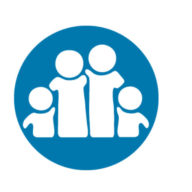Navigating Care
Do you or someone you love want or need the assistance of mental health experts? It can feel like a maze when trying to determine where to start or what options are available. We break down common questions and places to start your search.



Credentials: What Do They Mean?
LSW: Licensed Social Worker – An LSW is someone who has a bachelor’s or master’s degree in social work and is licensed as a social worker. For therapy, an LSW may provide therapy, but they will be supervised by someone who is an LCSW.
LCSW: Licensed Clinical Social Worker – An LCSW is a licensed clinical social worker who holds a master’s degree in social work and possesses an unrestricted clinical license and can provide therapy and clinical social work services independently and without oversight from another practitioner.
LPC: Licensed Professional Counselor – An LPC in someone who holds a master’s degree in counseling or psychology and is licensed practice therapy. An LPC will be supervised by an LCPC, an LCSW, or a licensed clinical psychologist (LCP)
LCPC: Licensed Clinical Professional Counselor – An LCPC is someone who holds a master’s degree in counseling or psychology and is licensed to practice therapy services independently and without clinical oversight from another practitioner.
LCP: Licensed Clinical Psychologist – An LCP is someone who holds a PhD in clinical psychology or a PsyD (a doctorate in clinical psychology), degrees which are the highest levels of academic and clinical training. LCPs often provide therapy for, diagnosis/evaluation/and treatment of mental illness. Clinical psychologists also specialize in testing and evaluation of many mental health conditions.
MD: Medical Doctor/DO Doctor of Osteopathy – A psychiatrist is an MD or DO who has attended medical school, completed a residency in psychiatry, and is trained in and licensed to practice medicine and prescribe medications for many mental health conditions and disorders. In general, psychiatrists do not provide therapy services to their patients.

Level of Care/Continuum of Service: Who Might Benefit?
Outpatient: Outpatient therapy or counseling is done in an outpatient setting. This is the lowest level of care. This level of care is appropriate for clients in the community who are seeking therapy or counseling services for a variety of reasons.
IOP: Intensive Outpatient is a higher level of care compared to outpatient treatment. In general, IOP is used in assessment and treatment of substance use and alcohol use disorders. It is also used for clients who have been recently discharged from inpatient treatment.
PHP: Partial Hospitalization Program is a slightly higher level of care compared to outpatient therapy and IOP. In general, PHP is used for clients who need regular, daily, structured treatment and intervention to mitigate and minimize symptoms of stress and/or mental illness. Treatment may include groups, individual counseling, and psychiatric medication.
Inpatient: Inpatient treatment is the highest level of care, which is strictly reserved for clients who are suicidal, homicidal, or acutely psychotic. Strict criteria must be met before someone can be hospitalized psychiatrically. The client must pose a clear-and-present danger/risk to him/herself or others, and a medical doctor (usually a psychiatrist) will sign a petition and certificate admitting the client to an inpatient psychiatric hospital.

Insurance Benefits: What Do I Need to Ask?
Before seeking therapy services, it is advisable to call your insurance company to verify coverage for behavioral health services. It is important to know what your deductible is, how much you must pay out of pocket before you meet your deductible, and what your copay will be. Additionally, it is important to verify that your therapist will be in network for your insurance plan and whether you will need a referral or prior authorization for therapy services.

Specializations: What Do I Need to Know?
Trauma-Informed Therapy: Means that your therapist is trained in recognizing how trauma impacts your life and how to help you work through your traumatic experiences.
Cognitive-Behavioral Therapy: CBT aims to stop negative thinking cycles by breaking down things that make you feel bad, anxious, or scared. It helps by making your problems more manageable, and CBT can help you change your negative thought patterns and improve the way you feel (i.e., your behavior).
Client-Centered Therapy: Client-centered therapy, or person-centered therapy, is a non-directive approach to talk therapy. It requires the client to actively take the reins during each therapy session, while the therapist acts mainly as a guide or a source of support for the client.
Dialectical Behavior Therapy: DBT provides clients with new skills to manage painful emotions and decrease conflict in relationships. DBT specifically focuses on providing therapeutic skills in four key areas: mindfulness, emotion regulation, interpersonal effectiveness, and increasing distress tolerance.
Psychodynamic Therapy: Psychodynamic therapy is an approach that involves facilitation of a deeper understanding of one’s emotions and other mental processes. It works to help people gain greater insight into how they feel and think. By improving this understanding, people can then make better choices about their lives. They can also work on improving their relationships with other people and work toward achieving the goals that will bring them greater happiness and satisfaction.

